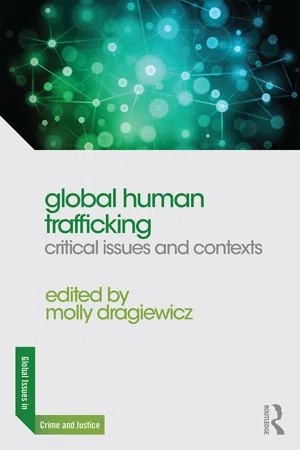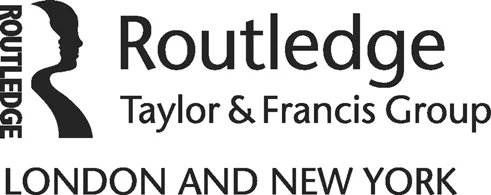
- 208 pages
- English
- ePUB (mobile friendly)
- Available on iOS & Android
About this book
Human trafficking has moved from relative obscurity to a major area of research, policy and teaching over the past ten years. Research has sprung from criminology, public policy, women's and gender studies, sociology, anthropology, and law, but has been somewhat hindered by the failure of scholars to engage beyond their own disciplines and favoured methodologies. Recent research has begun to improve efforts to understand the causes of the problem, the experiences of victims, policy efforts, and their consequences in specific cultural and historical contexts.
Global Human Trafficking: Critical issues and contexts foregrounds recent empirical work on human trafficking from an interdisciplinary, critical perspective. The collection includes classroom-friendly features, such as introductory chapters that provide essential background for understanding the trafficking literature, textboxes explaining key concepts, discussion questions for each chapter, and lists of additional resources, including films, websites, and additional readings for each chapter.
The authors include both eminent and emerging scholars from around the world, drawn from law, anthropology, criminology, sociology, cultural studies, and political science and the book will be useful for undergraduate and graduate courses in these areas, as well as for scholars interested in trafficking.
Tools to learn more effectively

Saving Books

Keyword Search

Annotating Text

Listen to it instead
Information
- Women, Crime and Criminal Justice
A global enquiryRosemary Barberet
- Global Human Trafficking
Critical issues and contextsEdited by Molly Dragiewicz
Global Human Trafficking

Contents
- List of contributors
- Acknowledgments
- 1 Introduction MOLLY DRAGIEWICZ
- SECTION I Critical contexts for thinking about trafficking
- 2 The trafficking policy debates JOYCE OUTSHOORN
- 3 Data matters: Issues and challenges for research on trafficking ELŻBIETA M. GOŹDZIAK
- SECTION II Key issues in trafficking research
- 4 Sex, violence, and the border: Trafficking for sex work from Mexico to the U.S. ANNA MATERNICK AND MELISSA HOPE DITMORE
- 5 At sea: The trafficking of seafarers and fishers from Ukraine REBECCA SURTEES
- 6 Human trafficking in “fresh” organs for illicit transplants: A protected crime NANCY SCHEPER-HUGHES
- 7 (Not!) child trafficking in Benin NEIL HOWARD AND SIMONA MORGANTI
- 8 Bride traffic: Trafficking for marriage to Australia KELLY RICHARDS AND SAMANTHA LYNEHAM
- SECTION III Trafficking policy: Intent and outcomes
- 9 Clinton, Bush, and Obama: Changing policy and rhetoric in the United States Annual Trafficking in Persons Report ERIN O’BRIEN AND MICHAEL WILSON
- 10 Service providers and their perceptions of the service needs of sex trafficking victims in the United States CLAIRE M. RENZETTI
- 11 On broken chains and missing links: Tackling the “demand side of trafficking”? JULIA O’CONNELL DAVIDSON
- SECTION IV Moving forward
- 12 “We have the right not to be ‘rescued’…“: When anti-trafficking programs undermine the health and well-being of sex workers AZIZA AHMED AND MEENA SESHU
- 13 Nothing like chocolate: Sex trafficking and child labor trafficking KUM-KUM BHAVNANI AND EMILY SCHNEIDER
- 14 Conclusion: The future of human trafficking research MOLLY DRAGIEWICZ
- Index
Contributors
Table of contents
- Cover Page
- Epigraph
- Half Title Page
- Frontmatter 1
- Title Page
- Copyright Page
- Table of Contents
- List of contributors
- Acknowledgments
- 1 Introduction—MOLLY DRAGIEWICZ
- SECTION I Critical contexts for thinking about trafficking
- SECTION II Key issues in trafficking research
- SECTION III Trafficking policy: Intent and outcomes
- SECTION IV Moving forward
- Index
Frequently asked questions
- Essential is ideal for learners and professionals who enjoy exploring a wide range of subjects. Access the Essential Library with 800,000+ trusted titles and best-sellers across business, personal growth, and the humanities. Includes unlimited reading time and Standard Read Aloud voice.
- Complete: Perfect for advanced learners and researchers needing full, unrestricted access. Unlock 1.4M+ books across hundreds of subjects, including academic and specialized titles. The Complete Plan also includes advanced features like Premium Read Aloud and Research Assistant.
Please note we cannot support devices running on iOS 13 and Android 7 or earlier. Learn more about using the app